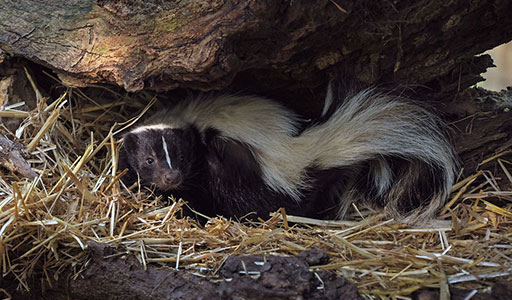Skunk Removal
Do you need to get rid of skunks? We can help!

Skunk Removal Strategies
If you have noticed the signs of a skunk living on your property, do not risk your safety trying to capture it yourself. Skunks are known to carry rabies and other diseases and have sharp claws that can be a danger to any pet or human. Our team of experts at Trutech know what it takes to remove these animals, whether dead or alive, from your property humanely. Trutech’s licensed specialists have the tools and knowledge to conduct proper skunk removal and skunk control services in your home, yard, or garage.
Here at Trutech, our passion is helping solve your wildlife problems quickly and in an environmentally sensitive way. Our humane skunk removals and controls ensure that no animals are harmed at any point in the wildlife maintenance process. So don’t wait until skunks have sprayed you or your pets, call in a team of experts at Trutech for a full skunk removal or skunk control on your property today!
Skunk Problem

Signs a Skunk is on Your Property
Evidence of their presence includes droppings, skunk tracks, shallow holes in lawns, and a foul scent.
Skunks are mid-sized black and white mammals known for their ability to spray a strong, foul smell when they are in danger. Skunks are omnivores, meaning that they feed off of both plants and animals in the wild.
Skunk tracks in snow, dirt, and mud are also sure signs of infestation. Often found near dens and digging sites. Tracks resemble cat prints with five stubby toes, each featuring a rounded pad and a long claw mark.
Skunks often dig burrows under porches and near foundations which can lead to structural damage.

Dangers of Skunk Infestation
Residents who own pets, especially dogs, should be careful to supervise their animal’s outdoor activities if skunks are known to frequent the area. When skunks are startled by another animal like your pets, they will discharge their spray at the aggressor.
Active during the night, skunks can destroy your property in several ways. Skunks will dig up sections of grass to pull up bulbs and other plants.
Skunks can carry dangerous diseases like rabies. If they create dens under buildings, skunks may cause structural damage.
Humane Skunk Removal & Control Strategies

Entry into property
Yards with tempting vegetable gardens, fruit or nut trees, birdfeeders, or infestations of lawn insects are inviting to hungry skunks. In addition to easy sources of food, skunks invade residential properties in search of safe places to burrow, such as in sheds, underneath porches, or beneath the foundation of buildings.

Trapping & Removal
The best way to eliminate problematic skunks from private properties is to enlist the aid of a professional wildlife control service. The experts at Trutech are trained to address skunk issues in the most effective manner possible and eliminate the presence of the troublesome creatures for good.

Prevention & Exclusion
Excluding skunks from residential properties is a matter of removing food sources and den sites that attract them. If fruit-bearing trees are present on the property, remove fallen fruits frequently. Clean up any spilled birdseed or pet food. Use secure, tightly fitted trash can lids to keep skunks from getting into the garbage. Place fencing around gardens to deter the animal as long as they are buried at least half a foot underground to thwart digging efforts. Seal up the spaces beneath decks, patios, and porches to eliminate the possibility of a den site being created.
Frequently Asked Questions
As skunks are nocturnal, property owners are typically first alerted to their presence in backyards by their putrid smell as opposed to actually spotting the animals. Individuals may also notice conical holes around yards, which are the result of skunks foraging for grubs. Additionally, on farms and in yards with poultry, skunks target chicken eggs as meals and may leave behind dead adult chickens as evidence of their existence.
As they’ve adapted to life in residential neighborhoods, skunks commonly den in homes, especially in dark and warm areas like basements and crawlspaces. House residents can be alerted to the presence of these pests by smells, sights, and sounds. For example, individuals may smell an unpleasant, musky odor commonly associated with skunk infestations, see scratches on house siding where the pests have forced their way inside and hear clawing and scurrying sounds coming from below.
Skunks are proficient burrowers and often enter basements and crawlspaces through holes in building foundations, ripped window screens, and uncovered vents. To prevent the pests from coming inside, homeowners should seal off gaps with wire mesh, concrete, or sheet metal. Further deter skunks from setting up dens on private properties by controlling the availability of insects in lawns and tightly securing trash lids. It is essential to not feed skunks or leave pet food outside.
Given their diet of grubs, earthworms, insects, fruits, and vegetables, skunks often target gardens as ideal feeding grounds. As the pests also make use of manmade structures as places to build dens, flowerbeds located on private properties are particularly enticing. Since skunks are gifted diggers, they easily make their way underneath fences protecting gardens or lawns.
Property owners can utilize habitat modification methods to reduce the possibility of finding skunks in gardens. Erecting fences that are buried at least three feet in the ground to thwart the pest’s digging abilities can be an effective means of exclusion. Frightening tactics such as strobe lights and loud noises also offer short-term control of infestations. Keel lawns clear of debris to limit available food sources and hiding places.
As they love to feast on berries, garden vegetables, pet foods, insects, and even garbage, skunks are drawn to private properties with frequency. Once the pests find steady food sources, they’re likely to set up dens nearby. Since houses have many secluded nooks and offer protection from harsh weather, skunks often force their way inside. Uncovered vents, pet doors, open windows, and holes in building foundations all serve as prime entrances.
While skunk odors in the house are one of the most apparent signs of an infestation, the smell alone does not automatically point to the presence of skunks. Homeowners should first check for natural gas leaks and ensure that family pets are not the cause of the odor.
If there appears to be no other source, individuals should assume the pest itself is the cause of the skunk smell in the house. Check common skunk hiding places, like underneath decks, patios, basements, and crawlspaces, to confirm. Homeowners may also notice conical holes appear in yards as a result of the pest’s feeding habits, or scratches on siding as evidence of forced entry.
Skunks regularly seek out new dens, which they use year-round to rest during daytime hours and rear young. As more residential neighborhoods encroach on natural skunk habitats, the pests must look for creative nesting sites and often use outbuildings like sheds for shelter.
Skunks are excellent diggers and often create their own burrows or use the deserted burrows of other animals. They finagle their way under manmade structures using a combination of their digging prowess and by exploiting gaps in structures’ foundations.


